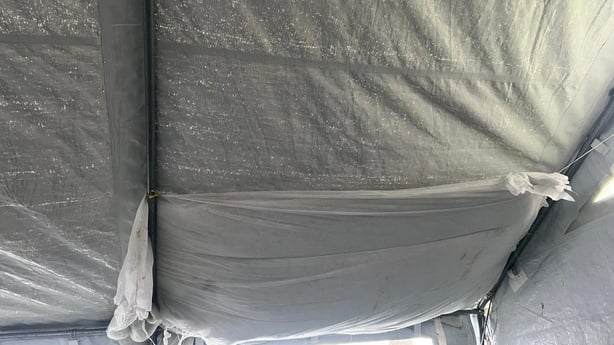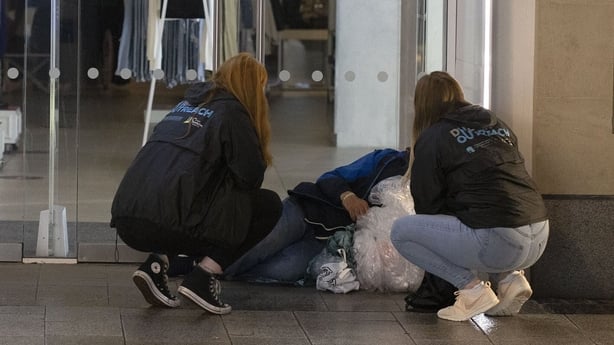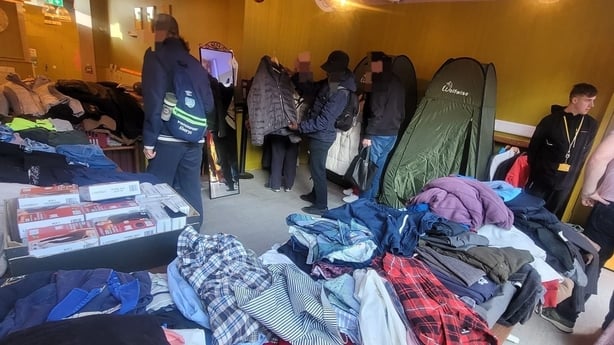All asylum seekers living in tents at a State-run centre in Newtownmountkennedy, Co Wicklow, are being moved to another tented facility in Dundrum in Dublin during the current cold snap, the Department of Integration said.
The department said the tents at the site of the former Central Mental Hospital were "better equipped to deal with the current weather conditions".
Local volunteers had raised concerns about conditions in the tents, especially during the cold weather.
Warnings for low temperatures are in place across the country.
It follows a decision yesterday to move those living in tents at an International Protection Accommodation Service (IPAS) facility in Crooksling in the Dublin Mountains to indoor accommodation.
A spokesperson for the department confirmed that for now, residents at other tented IPAS sites at Columb Barracks in Mullingar and Knockalisheen in Co Clare will remain in tents.
They said that those two sites were "managing well at the moment" and that "residents at these sites have also been provided with extra blankets".
"The safety and wellbeing of residents in our accommodation centres, and in particular this week at our tented sites, is our priority," the spokesperson said.
"We are in the process of arranging for people who are staying in tents at River Lodge in Newtownmountkennedy to move to alternative tented accommodation at the Central Mental Hospital.

"The tented accommodation at the Central Mental Hospital is better equipped to deal with the current weather conditions," they said.
"At Crooksling, we reacted immediately yesterday after some of the tents were damaged by weather conditions," they added.
"We implemented our contingency plan and all people staying there have now been temporarily moved inside, with a small number moved to another site," and "people staying at Crooksling have also been provided with extra blankets," the spokesperson said.
IPAS figures published on 10 November showed that 909 adult male asylum seekers were currently being accommodated in IPAS tented accommodation.
Rough sleeping teams "flat out" to address sub zero "emergency"
Dublin Simon Community CEO Catherine Kenny has described the current cold snap as "an emergency" that requires "an immediate response".
"The outreach teams have been flat out" Ms Kenny told RTÉ News.
Dublin Simon issued an appeal to the public to look out for people sleeping rough this week amid the current Status Yellow low temperature and ice warning across the country.
The appeal put it starkly: "Sleeping rough during periods of very low temperatures can pose a serious risk to life."
"As you can appreciate, somebody sleeping on concrete, not only is it cold but it saps the energy, and it saps whatever heat is there.

"So, it's about making sure that we are putting in place as many measures as we can to keep them as safe and as warm as possible in sheltered places." Ms Kenny said.
She added that Dublin Simon had seen an increase in contacts from those sleeping rough looking for emergency accommodation during the cold weather.
However, she stressed that each case is different and even as temperatures drop some people will still feel that they "can't or don't want to avail of accommodation".
"For those we can't accommodate it's about keeping them as safe as we can, providing extra winter gear, providing extra socks and waterproofs," Ms Kenny said.
'Incredibly anxious time'
Dublin Simon's soup run and breakfast run volunteers are also delivering hot soup, tea, and nutritious food to people sleeping outdoors in Dublin city centre, she said.
Ms Kenny added: "It's an incredibly anxious time for us, and we need to work with the (rough sleeping) person so it is an incredibly anxious time for them. They don't want to be in the situation they're in."
She also noted that this was only "the beginning of the cold season unfortunately."
According to the Dublin Region Homeless Executive (DHRE), a new capacity of 192 permanent beds were provided as part of the latest cold weather strategy.
A further 104 additional beds can also be activated when there is a weather warning in place.
A spokesperson said: "DRHE along with our outreach providers will monitor the weather and likely changes to weather warnings over the coming days and activate extreme weather emergency accommodation as required."
Those working at the Tiglin Lighthouse Cafe have been extremely busy this week too.
They have had people "coming in with their sleeping bag draped around their shoulder to see if we can dry them off", the charity's co-founder and chair Aubrey McCarthy explained.

"Of course when it's really extreme we give them a new tent and a new sleeping bag, but we don't want to.
"A tent and a sleeping bag is when people go camping, that is our childhood memory, it's not to live in, it's a very temporary fix and in extreme cold weather it is just not the norm," Mr McCarthy said.
Tiglin is a homelessness and addiction charity, however Mr McCarthy explained how its services have now been expanded to provide an outreach service for a group of people who fall outside the usual rough sleeper provisions: rough sleeping International Protection Applicants.
"What we have found is the IPAs, the International Protection Applicants, they are outside of the cold weather initiative, so we have a dedicated team specifically for them," Mr McCarthy said.
He added: "What they do is at night time - up to midnight - they go where the people are staying, where we get reports of people staying.
"They check on them, on their welfare and then they take their details and then they work with the Department (of Integration) to advocate for accommodation for them. That is usually done within 48 hours."
DHRE has said that the responsibility for providing accommodation rests with the International Protection Accommodation Service, under the Department of Children.
A spokesperson for the Department said that "any International Protection Applicants who are unaccommodated and are rough sleeping are the main focus of the IPAS cold weather response plan".
And that "IPAS is currently able to make offers of accommodation to international protection applicants found actively rough sleeping in the Dublin area".
"Our team... it usually comes across anywhere between 10 and 30 people (international protection applicants who are rough sleeping) each night" Mr McCarthy said.
There are currently 2,897 male IPAs who arrived since last December who have yet to receive an offer of State accommodation.
During the summer, encampments of rough sleeping international protection applicants were cleared from around the International Protection Office on Mount Street and along the Grand Canal in Dublin city centre.
At that time some of those offered accommodation had spent months sleeping rough.
Mr McCarthy praised the work done by his team and the Department of Integration to reduce the time it now takes for offers of accommodation to be made to rough sleeping asylum seekers.
Nevertheless, he said it remains a worrying time.
"I am just praying that no lives will be lost during this cold weather snap," he said.







